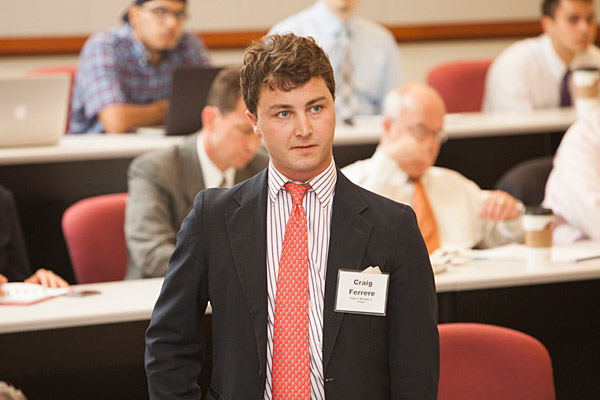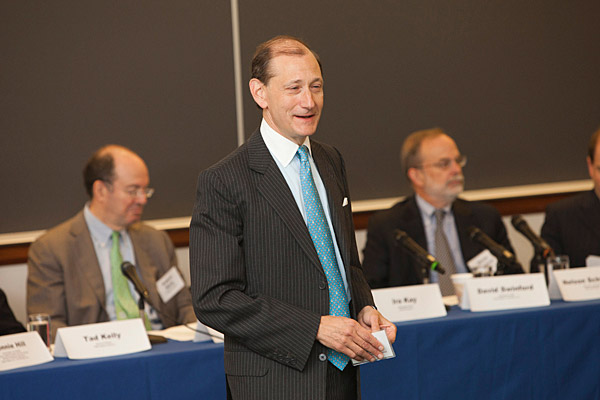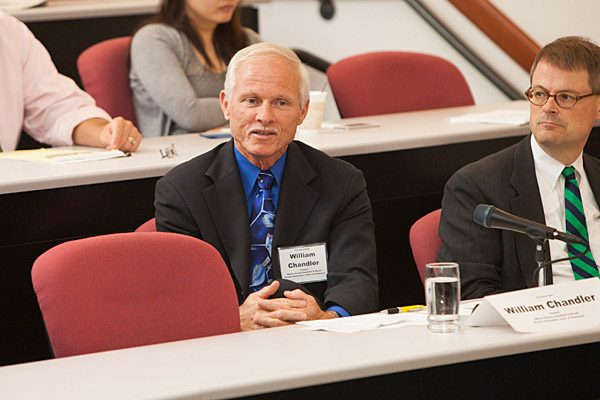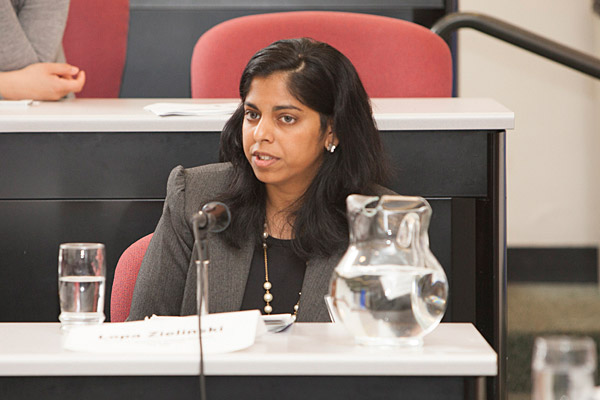Executive compensation
Woolard Fellow presents research, ignites debate at Weinberg Center event
11:35 a.m., May 14, 2012--Corporate executive compensation packages are not developed with ease and a lot of the time not everyone involved is happy with the process or the outcome. A panel of top executives, judges, academics, lawyers and governance experts gathered at the University of Delaware on May 8 to consider this problem and its possible solutions.
The panel, “Punting Peer Groups: Resolving the Compensation Conundrum,” was presented by the John L. Weinberg Center for Corporate Governance (WCCG) in UD’s Alfred Lerner College of Business and Economics.
Campus Stories
From graduates, faculty
Doctoral hooding
Unique to this panel, Craig Ferrere, a 2011 UD graduate and recipient of the first Edgar Woolard Fellowship last spring, presented his research to date on executive compensation models and progress toward creating a methodology for assessing CEO pay and performance.
Bruce Weber, dean of the Lerner College, opened the event and expressed his excitement for the topic and upcoming debate.
“This is exactly the kind of event a dean wants to have in his school: one that brings together all of the educators and thought leaders of the industry,” said Weber.
Charles M. Elson, Edgar S. Woolard, Jr., Chair in Corporate Governance and director of the WCCG, moderated the panel and began by introducing Ferrere.
“Initially Craig argued the mathematical implications of the peer group but the paper replaced that with research concerning the notion of the peer group,” said Elson. “This is a very important topic that needs to be resolved and this panel is unique because they can actually do something about it.”
Ferrere went on to present his research and addressed the panel with his concerns about the relationship between pay and performance.
“We need to deemphasize peer groups,” said Ferrere. “They should be helpful in determining pay but CEOs are specifically talented and not interchangeable.”
Ferrere also argued that most companies see CEOs as transferable. To keep them happy and deter them from leaving, said Ferrere, companies will raise compensation based on peer groups to persuade them to stay which fuels the problem of constantly rising pay.
Ferrere’s questioning of peer groups and compensation committee practices ignited debate among the panel.
William B. Chandler, III, partner with Wilson Sonsini Goodrich and Rosati and former chancellor of the Delaware Court of Chancery, was the first to respond to Ferrere. He explained that CEOs can be transferable but also offered that peer groups should be indicators and not deciders.
“If you’re going to criticize the use of peer groups,” said Chandler, a UD alumnus and member of the University's Board of Trustees, “what are boards and committees going to use instead?”
Lopa Zielinski, director of corporate governance and senior counsel, TIAA-CREF, agreed with Chandler that peer groups have their place.
“We do not simply follow the recommendations of proxy investors and state peer groups,” said Zielinski. “We truly look at things on a case-by-case basis when building a compensation plan.”
Robert Rock, chairman and publisher, Directors and Boards, and director of Alberto-Culver Co., Penn Mutual Life Insurance Co., Quaker Chemical Co. and Advanta Corp, brought an interesting historical perspective to the group.
“At first peer groups were formed to weigh the value of a job not the individual,” said Rock. “The goal was to create a universal measurement that could be a benchmark throughout the world.”
David Swinford, president and CEO of Pearl Meyer and Partners Inc., explained that peer groups also help compensation committees combat executives who demand an irrational compensation package.
In the end, many of the panelists agreed that peer groups can be flawed and more emphasis should be placed on using peer groups properly but argued elimination would require a replacement.
Elson ended the debate and thanked the panelists for their input, the Investor Responsibility Research Center for its support, and Ferrere for presenting his research and engaging the panel.
“Today’s discussion is what the Weinberg Center is all about: internal research that invokes debate,” said Elson.
About the panel
The complete roster of panelists included Kenneth Bertsch, chairman and CEO, Society of Corporate Secretaries and Governance Professionals; William Chandler, partner, Wilson Sonsini Goodrich and Rosati, and former chancellor of the Delaware Court of Chancery; Bonnie Hill, co-founder, Icon BLUE, and director of California Water Service Group, AK Steel Holding Corporation, Home Depot, Inc., and Yum Brands, Inc.; Sam Glasscock, III, vice chancellor of the Delaware Court of Chancery; Ira Kay, managing partner, Pay Governance; Thomas L. Kelly, general partner, CHB Capital Partners, and director of Ensco, PLC; Aeisha Mastagni, investment officer, California State Teachers' Retirement System (CalSTRS); Robert McCormick, chief policy officer, Glass Lewis; Patrick McGurn, special counsel, ISS-MSCI; Robert Rock, chairman and publisher, Directors and Boards, and director of Alberto-Culver Co., Penn Mutual Life Insurance Co., Quaker Chemical Co. and Advanta Corp.; Nelson Schwartz, business journalist, The New York Times; David Swinford, president and CEO, Pearl Meyer and Partners, Inc.; and Lopa Zielinski, director and senior counsel, corporate governance advocacy and oversight, TIAA-CREF.
Article by Arianne Minch














